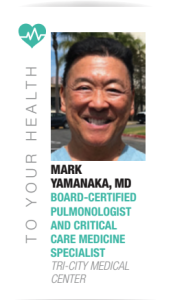Stay healthy and surf for life
From one surfer to another: the doctors at Tri-City Medical Center are here to help. “Even though I sliced my foot on the fin of the board and had to have stitches on my first time out surfing, I’ve been hooked ever since,” reminisces Mark Yamanaka, MD, a board-certified pulmonologist and critical care medicine specialist, who is the medical director of the Intensive Care Unit at Tri-City Medical Center (TCMC).
“A high school friend wanted to learn how to surf and asked me to go with him because he was afraid of getting hurt – how ironic is that!” Dr. Yamanaka, as well as other doctors at Tri-City Medical Center, have treated surfers – both men and women – with a wide range of injuries and infections. “Some of the most common injuries are within the upper body. These are more often related to wear and tear on the ligaments and tendons, than broken bones or dislocations. Lacerations and scrapes are also common.
These types of injuries usually occur when a person hits a surfboard, like I did, or rocks or reef.” Although surfers may worry about shark attacks, they are rare. Painful stings are more frequent occurrences and can lead to infections, which should be treated quickly. Dr. Yamanaka recommends that anyone who spends time in the ocean should get Hepatitis A and B vaccinations.
“Some of the waters are not clean and expose surfers to viruses, bacteria and parasites that may cause disease or stomach upset.” Other ailments affect their eyes, ears, nose and skin. Surfer’s eye is a growth caused by long-term exposure to wind, UV light and bacteria in ocean water. Pink eye occurs when the membrane inside of the eyelid becomes inflamed and red. Surfer’s ear involves bone growth around the ear canal due to irritation and exposure to cold water. An ear infection can result if water is trapped behind the growth.
Too much exposure to salt water and its parasites or the rubbing of a wetsuit against the skin may cause an irritating surf rash, which is why many surfers wear a rashguard under their wetsuit. “Often these health issues can be prevented by using the right gear, knowing the limits of your experience and observing your surroundings,” added Dr. Yamanaka. “But sometimes, surfers can end up in the emergency room, especially those visiting or new to the sport, after experiencing a near drowning because they were unfamiliar with riptides and then panic. Any surfer can have an event, such as a heart attack or stroke while in the water or be overcome by the extreme heat.”
overcome by the extreme heat.”
“Many of the doctors at Tri-City can relate because they are surfers too. Whether you need an Pulmonary/Critical Care doctor like me, or an orthopedist, family practice, dermatologist or ENT, we’ve got you covered. We live by the coast too and know the unique health conditions that may occur from spending so much time in the ocean.” Dr. Yamanaka continued, “We also know the importance of maintaining good physical and mental health and strive to impart that to our patients. Eating a healthy diet and exercising helps us to be physically strong. But I think most of us would agree that we surf because it is a way to relax.”
“When I’m out in the ocean, I ignore everything behind me and face the horizon to look for the surf coming in. On a nice day, you have the sky, the surf and maybe a dolphin or two. The other surfers are mellow and out there for the same reason – to rejuvenate. ”
To learn more about its services, visit Tri-City Medical Center or call 855-222-8262.
We are currently experiencing a power outage.
We expect the power to be restored at 3PM PDT.
We expect the power to be restored at 3PM PDT.
